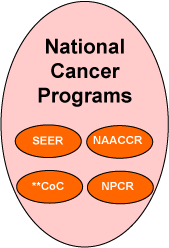National Cancer Programs

National cancer programs provide leadership for collecting, disseminating, and interpreting cancer surveillance data. They perform and provide a resource for research and help to address the cancer burden in the U.S.
National Program of Cancer Registries (NPCR)
Established by Congress through the Cancer Registries Amendment Act in 1992, and administered by the Centers for Disease Control and Prevention (CDC), the National Program of Cancer Registries (NPCR) collects data on the occurrence of cancer; the type, extent, and location of the cancer; and the type of initial treatment. These data represent 98 percent of the United States population.
Surveillance, Epidemiology and End Results (SEER) Program
The Surveillance, Epidemiology and End Results (SEER) Program of the National Cancer Institute is an authoritative source of information on cancer incidence and survival in the United States. SEER collects and publishes cancer incidence and survival data from population-based cancer registries covering approximately 26 percent of the United States population.
Commission on Cancer (CoC)
The American College of Surgeons (ACoS) Commission on Cancer (CoC) is a consortium of professional organizations dedicated to improving survival and quality of life for cancer patients through standard setting, prevention, research, education, and monitoring quality of care.
North American Association of Central Cancer Registries (NAACCR)
The North American Association of Central Cancer Registries (NAACCR) is a collaborative umbrella organization for cancer registries, governmental agencies, professional organizations, and private groups in North America that are interested in enhancing the quality and use of cancer registry data.
**CoC receives data directly from hospitals.
- Page last reviewed: November 23, 2015
- Page last updated: November 23, 2015
- Content source:
- Maintained By:


 ShareCompartir
ShareCompartir